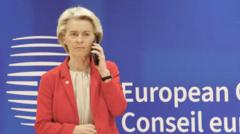The European Court's decision marks a significant moment for accountability within EU dealings, as it demands the release of crucial text messages that could expose the nature of the negotiations with Pfizer.
European Court Rules Against EU Commission in Von der Leyen-Pfizer Texts Controversy

European Court Rules Against EU Commission in Von der Leyen-Pfizer Texts Controversy
EU's judicial body mandates transparency in Covid-vaccine negotiations, challenging the Commission's refusal to disclose communications.
The European Commission has been directed by the EU's highest court to release text messages exchanged between Ursula von der Leyen, President of the Commission, and Albert Bourla, CEO of Pfizer, concerning Covid-19 vaccine negotiations. The Court's General ruling stated that the Commission failed to provide a convincing rationale for withholding the content of these communications when prompted by an investigative journalist's request in 2021. This event took place amid a backdrop of multimillion-euro contracts Pfizer signed with the EU for vaccine doses, including a notable agreement for 1.8 billion additional doses.
The issue has gained notoriety in Brussels and is now commonly referred to as "Pfizergate," symbolizing the ongoing public concern surrounding transparency in governmental dealings, particularly in response to public health crises. Transparency International commended the Court's decision as a significant breakthrough for transparency across the EU, arguing that it represents a much-needed shift away from restrictive information-sharing practices.
Ursula von der Leyen's leadership, starting in 2019, faced the formidable challenge of guiding the EU through the COVID pandemic, a critical role that has drawn scrutiny given the recent ruling. While the European Commission has pledged to analyze the ruling and deliberate on subsequent actions, it persists in asserting that its commitment to transparency is unwavering.
The controversy ignited in April 2021, after New York Times journalist Matina Stevis exposed private negotiations between von der Leyen and Bourla, just after BioNTech, Pfizer's German partner, achieved regulatory approval for the vaccine. Following this, journalist Alexander Fanta, backed by a Freedom of Information request, sought access to the text exchanges spanning from January 2021 to May 2022. However, the Commission denied the request, claiming the absence of the documents.
As the debate unfolded, officials within the Commission highlighted ongoing ambiguities regarding mobile text messages' classification as public records. An internal stance indicated that SMS communications were not automatically categorized as public documents, complicating the matter further. Fanta escalated the case to the European Ombudsman, who found that the Commission had failed to properly seek out the text messages in question, classifying it as maladministration.
Despite ongoing investigation and public interest, the Commission's continued refusal to release the messages led to legal action by Stevis and the New York Times. In its ruling, the Court criticized the Commission for relying on assumptions rather than solid evidence and stated that it was now the responsibility of the Commission to clarify whether the text messages exist or have been deleted—either intentionally or as a result of changes in von der Leyen’s mobile phone devices.



















